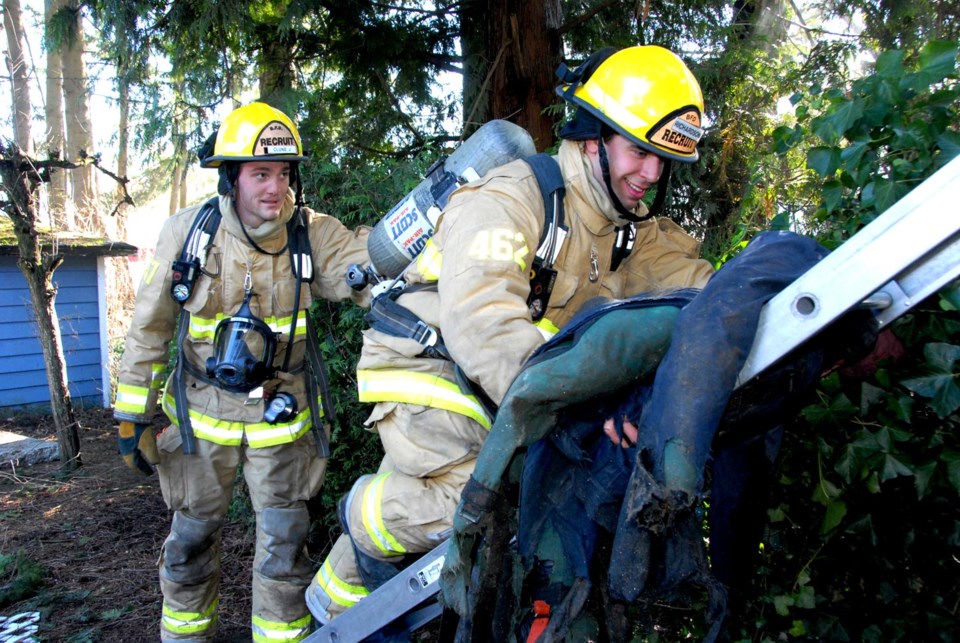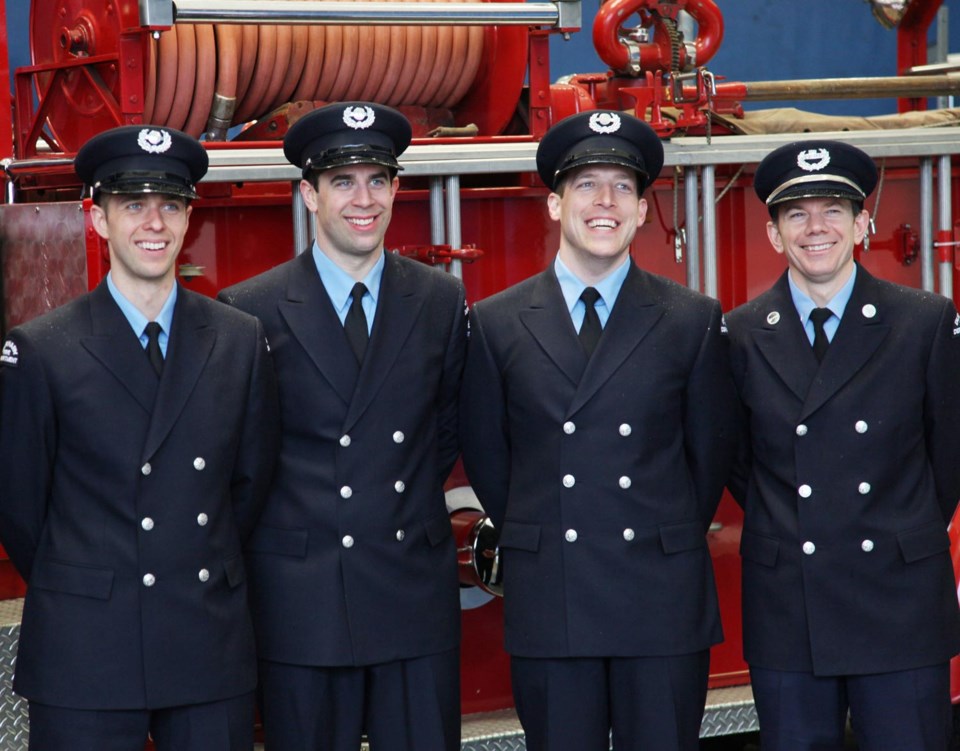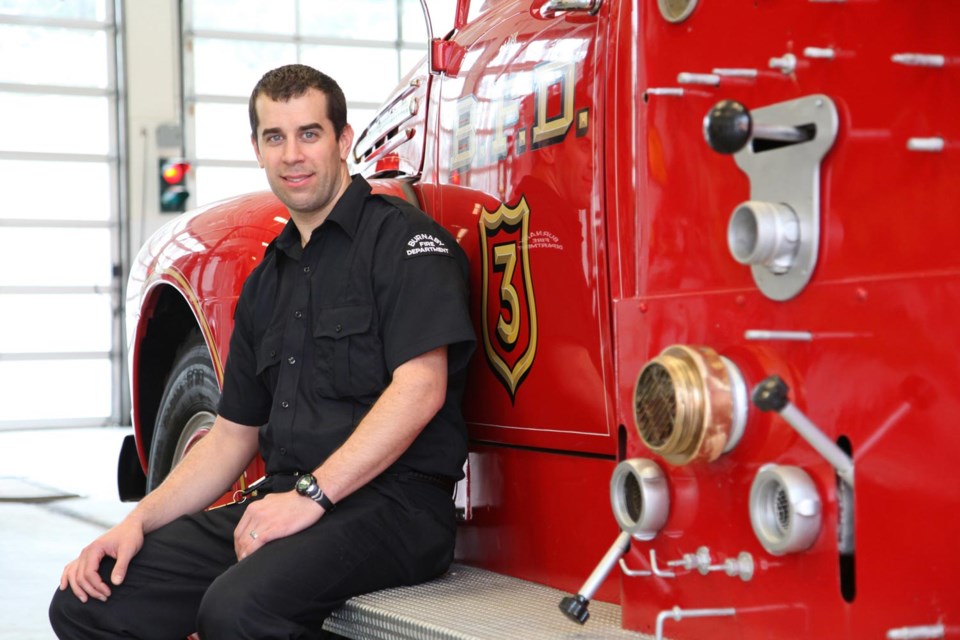What does it take to make the grade in the Burnaby Fire Department? BurnabyNOW reporter Cayley Dobie sat down with two Burnaby training officers, two of the department’s 2014 recruits and the director of the fire and safety division at the Justice Institute of B.C. to find out what all the fuss was about the Burnaby Fire Department. In this, the second instalment of her series, she talks with Kevin Richardson, a new recruit.
*
Kevin Richardson says he always knew he wanted to be a firefighter.
The 30-year-old had heard nothing but good things about the department and decided that if he was going to be a firefighter, he was going to be a Burnaby firefighter.
During the nine weeks of training, Richardson and six other recruits were taught a number of important firefighting skills, including hose work and auto extraction. The recruits also underwent fire attack training, rapid intervention team training and, of course, live fire training.
CD: Tell me about your application process.
KR:It was a long haul. I applied originally in 2012, and I made it to interview process and then after the interview I got released. The following year I applied again and the same thing happened, I got cut again, so then I went overseas to play hockey.
CD:What happened when you went overseas?
KR:Burnaby emailed me saying, “We’d like you to come back and go along the orientation and the ride-along process.” So I flew home from Germany, … and went on the ride-along and the orientation and then went right through to the physical and the chief’s interview. Then from there, they hired six guys and then they put another 12 of us on the hire list, and I was lucky enough to be on the hire list.
The following year, in September 2013, they (the Burnaby Fire Department) called and said they’d like to start a mini orientation process. So I came back and went through the mini orientation and did another quick physical and then the chief’s interview.
It was still a long haul.
CD: Did you only apply to Burnaby?
KR: Honestly, for a guy trying to get (hired) nowadays, it’s hard. I think for the most part, every one of us have tried and tried, we’ve tried in multiple cities. Having said that though, if you talk to firefighters across the Lower Mainland, and I’m not just saying this, they always say Burnaby is the place to get hired. Some other departments, I just don’t know what’s going on, but everybody that you talk to says it’s a definitely a lottery win type of job (to work in Burnaby).
CD: What’s training been like so far?
KR:It’s been a lot of fun. Pretty much everything, and more, of what I expected – it’s awesome.
I went to Texas to do the (fire) training, and all I remember from those two weeks was having the bunker gear on and doing drills and stuff, it was just an awesome feeling. I think for all of us who have just been hired, and I’m sure the people before us, being active is one of the highlights of the job. Everyday can be different; it’s go, go, go. It’s hard work, but it’s fun.
It’s just a job where you wake up and you’re excited to go to work – and it’s only been five weeks. It’s just awesome, and I’m sure it’s just going to get better.

CD:What has been your favourite part of training?
KR:Getting to know the guys on the first day. Some of them, I think, knew each other from sports, but I didn’t know anybody so getting to know them over the weeks has been kind of cool, they’re all really good guys. We’re at that point now where we can start giving each other a hard time. That’s been a pretty fun part so far.
CD:What do you expect for the remainder of the training program?
KR:It’s going to be tough the whole way through, but it’s meant to be that way I think, so it’s a good thing. We’re getting into doing some other things, some more hose work and we’re doing auto extrication coming up. We just finished Hazmat and we’re doing first responder (training) this week. The reallyexciting part coming up is the live fire, which I believe is in a couple of weeks. We actually get to go in and put out a live fire and basically apply what we’ve learned in these past five weeks and kind of put it all together for the live fire. That’s kind of the highlight. … I’m really looking forward to it.
CD:How important is being a team player?
KR:I think it’s the most important part. Pretty much everything, especially on an emergency incident, is based on a team. It’s the most important for sure.
We’ve always been told that apparently it’s just like a dressing room. Being with all the guys, it’s like a home away from home atmosphere. It’s just going to be like your second family.
I think it’s just really beneficial to have that team background because that’s what the fire service is, it’s all about that team environment and, yeah, having a hockey background or soccer background or a team background, I think it’s really good.
CD: Do you feel more prepared now that you’ve been through training?
KR:Even from Day 1 until now, you feel so much better getting your hands on everything. Having said that, though, it’s a team environment all the way, so once we get on a shift, we’re definitely going to rely on all the guys with all the experience. We’re all team guys that have been hired, and we all feel comfortable working in a team environment, so I’m sure we’ll have lots of help. Obviously, it’s going to be a little nerve-wracking at the start just because it’s a new thing and we don’t want to mess up, that sort of thing, but I’m sure we’ll have excellent help from the guys on the shift.
CD:What do you think your biggest challenge will be as a firefighter?
KR:The toughest thing for a new guy coming in, I think, will be the incidents with the children. I just had a kid, so to go to an incident and see family members who may have lost someone, especially children, I think would be hard to deal with.
CD:How will you prepare for this?
KR: I don’t think you really can. I think it’s something that all you can do is maybe talk to the guys who are on shift who have probably gone through that and dealt with it. I think the best thing you can do is talk to them about that because it’s not really something you can prepare yourself for. We know it’s part of the job. We know it’s mostly likely going to happen, so I think it’s all about how you deal with it.

CD:What do you expect the most rewarding part of being a firefighter will be?
KR:The most rewarding part, of course, is helping out people in your community, and I think at the end of the day you’re going to feel like you’ve accomplished something. I think when you get a call to go somewhere for a medical call or something, that person isn’t having a great day, so … I’m just looking forward to helping them. I know it sounds lame, but it’s the truth.



